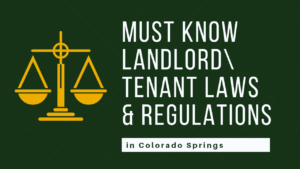
When you’re renting out a property in Colorado Springs, it’s important that you understand the laws and requirements that come with being a landlord. You need to provide a habitable and safe home for your tenants, and your tenants in return must pay you the agreed-upon rent every month.
It’s easy to make mistakes if you don’t know or understand the legal requirements. Today, we’re touching on just a few of the things you need to know. We strongly encourage you to educate yourself completely on the landlord and tenant laws, or to work with a professional Colorado Springs property management company that can keep you safe from liability and ensure you’re always in compliance.
Federal Laws – Fair Housing and ADA
Some of the most important laws that landlords must pay attention to are federal laws. Fair housing laws, for example, make it illegal to discriminate against several classes of people when you’re marketing your property, screening applications, or enforcing your lease with tenants. Make sure you’re consistent, and have documented processes that demonstrate you are fair and treating everyone equally
The Americans with Disabilities Act is also important. It’s not enough to avoid discriminating against people with disabilities when it comes to your property; you’re also required to make reasonable accommodations for people who need them. Service and support animals are a big part of this.
Colorado Security Deposit Laws
There is no limit to the security deposit amount that you collect. However, Colorado law does stipulate how quickly the security deposit must be returned. Generally, it’s within 30 days of a tenant moving out. If you want more time, make sure that it’s stipulated in your lease agreement. When your lease reflects it, you can have up to 60 days to return a deposit. If you withhold any money from the tenant’s deposit, you’ll need to provide a complete and detailed accounting of where that money was spent.
If a tenant believes you did not return the deposit in time or that you inappropriately withheld funds, you can be sued in court for treble damages. Make sure you are careful with the security deposit.
Raising the Rent in Colorado
 Colorado Springs does not have rent control, and landlords can raise the rent at the end of any lease term, before a new lease begins. If you’re renting to a tenant on a month-to-month basis, you’re required to give your tenant 10 days of notice before you increase the rent.
Colorado Springs does not have rent control, and landlords can raise the rent at the end of any lease term, before a new lease begins. If you’re renting to a tenant on a month-to-month basis, you’re required to give your tenant 10 days of notice before you increase the rent.
If rent is late or unpaid, you need to provide a Three Day Notice to Pay or Quit before you file for an eviction. Landlords must immediately take care of habitability issues; otherwise a tenant can withhold rent. For example, if you don’t fix a furnace and the tenant is without heat in winter, it’s that tenant’s right to hold back the rent until the repair is made.
These are some of the most important laws and requirements that you need to know as a Colorado Springs landlord. There’s a lot more involved, so please contact us at Muldoon Associates to hear more. We’d be happy to help you understand the responsibilities and expectations of landlords and their tenants.
